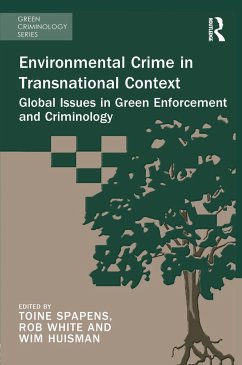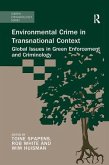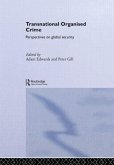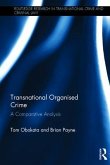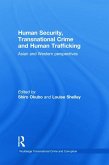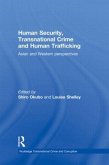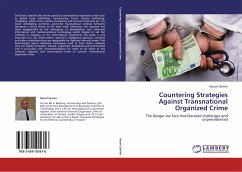Environmental Crime in Transnational Context
Global Issues in Green Enforcement and Criminology
Herausgeber: Spapens, Toine; Huisman, Wim; White, Rob
Environmental Crime in Transnational Context
Global Issues in Green Enforcement and Criminology
Herausgeber: Spapens, Toine; Huisman, Wim; White, Rob
- Gebundenes Buch
- Merkliste
- Auf die Merkliste
- Bewerten Bewerten
- Teilen
- Produkt teilen
- Produkterinnerung
- Produkterinnerung
This book provides an overview of the developments and problems in the field of transnational environmental crimes and harms, one of the most profitable and fastest growing areas of international criminal activity. The contributors consider a range of issues such as: global issues in green criminology; responses to transnational environmental crimes and harms; alternative methods to combat environmental crime; and specific types of crimes and criminological research. These topics are considered from the perspectives of enforcement, deterrence, compliance and emission trading schemes.
Andere Kunden interessierten sich auch für
![Environmental Crime in Transnational Context Environmental Crime in Transnational Context]() Environmental Crime in Transnational Context68,99 €
Environmental Crime in Transnational Context68,99 €![Transnational Organised Crime Transnational Organised Crime]() Adam Edwards (ed.)Transnational Organised Crime206,99 €
Adam Edwards (ed.)Transnational Organised Crime206,99 €![Transnational Organised Crime Transnational Organised Crime]() Tom ObokataTransnational Organised Crime216,99 €
Tom ObokataTransnational Organised Crime216,99 €![Human Security, Transnational Crime and Human Trafficking Human Security, Transnational Crime and Human Trafficking]() Human Security, Transnational Crime and Human Trafficking63,99 €
Human Security, Transnational Crime and Human Trafficking63,99 €![Human Security, Transnational Crime and Human Trafficking Human Security, Transnational Crime and Human Trafficking]() Shiro Okubo / Louise I Shelley (eds.)Human Security, Transnational Crime and Human Trafficking238,99 €
Shiro Okubo / Louise I Shelley (eds.)Human Security, Transnational Crime and Human Trafficking238,99 €![Countering Strategies Against Transnational Organized Crime Countering Strategies Against Transnational Organized Crime]() Besart QerimiCountering Strategies Against Transnational Organized Crime46,99 €
Besart QerimiCountering Strategies Against Transnational Organized Crime46,99 €![Transnational Environmental Crime Transnational Environmental Crime]() Rob WhiteTransnational Environmental Crime216,99 €
Rob WhiteTransnational Environmental Crime216,99 €-
-
-
This book provides an overview of the developments and problems in the field of transnational environmental crimes and harms, one of the most profitable and fastest growing areas of international criminal activity. The contributors consider a range of issues such as: global issues in green criminology; responses to transnational environmental crimes and harms; alternative methods to combat environmental crime; and specific types of crimes and criminological research. These topics are considered from the perspectives of enforcement, deterrence, compliance and emission trading schemes.
Hinweis: Dieser Artikel kann nur an eine deutsche Lieferadresse ausgeliefert werden.
Hinweis: Dieser Artikel kann nur an eine deutsche Lieferadresse ausgeliefert werden.
Produktdetails
- Produktdetails
- Verlag: Routledge
- Seitenzahl: 326
- Erscheinungstermin: 23. Juni 2016
- Englisch
- Abmessung: 240mm x 161mm x 22mm
- Gewicht: 655g
- ISBN-13: 9781472469625
- ISBN-10: 1472469623
- Artikelnr.: 48032759
- Herstellerkennzeichnung
- Libri GmbH
- Europaallee 1
- 36244 Bad Hersfeld
- gpsr@libri.de
- Verlag: Routledge
- Seitenzahl: 326
- Erscheinungstermin: 23. Juni 2016
- Englisch
- Abmessung: 240mm x 161mm x 22mm
- Gewicht: 655g
- ISBN-13: 9781472469625
- ISBN-10: 1472469623
- Artikelnr.: 48032759
- Herstellerkennzeichnung
- Libri GmbH
- Europaallee 1
- 36244 Bad Hersfeld
- gpsr@libri.de
Toine Spapens is Full Professor of Criminology at Tilburg University, the Netherlands. He received his PhD. in criminology in 2006. Since the early 1990s, Spapens has done extensive empirical research on (organised) crime and its containment, and on international law enforcement cooperation. His studies include illegal firearms trafficking, ecstasy production, large-scale cannabis cultivation, illegal gambling and environmental crime. His theoretical work focuses on regulation of illegal markets and network theories of crime. Rob White is Professor of Criminology at the University of Tasmania, Australia. He has written widely in the areas of criminology and youth studies, and has a particular interest in issues related to environmental harm, ecological justice and green criminology. His recent books are Transnational Environmental Crime: Toward an eco-global criminology (Routledge, 2011), Climate Change from a Criminological Perspective (Springer, 2012) and Environmental Harm: An Eco-Justice Perspective (Policy, 2013). He is the author of Crimes Against Nature (Willan, 2008). Wim Huisman is professor of Criminology and chair of the Department Criminology at VU University Amsterdam. His main research interests and expertise lie in the field of organized and corporate crime and regulatory enforcement. Huisman is also editor of the Dutch Journal of Criminology and a member of the board of the European Working Group on Organizational Crime.
Contents: Preface; Introduction, Toine Spapens, Rob White and Wim Huisman.
Part I The Global Context of Environmental Crime and Green Criminology: The
contested planet: global green criminology, environmental crime and the
world, Nigel South; Tackling cross-border environmental crime: a 'wicked
problem', Toine Spapens and Wim Huisman; Illegal wildlife trade to the EU
and harms to the world, Daan van Uhm; Is green criminology
paradigm-breaking? Some reflections on hydrocarbon and resource extraction,
crime and criminological thinking, James Sheptycki. Part II Law Enforcement
Responses to (Transnational) Environmental Crime: Addressing transnational
environmental crime: the role of intelligence-led policing, Carole Gibbs;
Regulatory responses to transnational environmental crime: an overview of
choices, challenges and culture, Grant Pink; Transboundary international
fisheries crime and restitution for South Africa: the case of United States
v Bengis, 2013, Jan Glazewski'; Four problems for specialist courts in
dealing with nonhuman environmental victims, Rob White. Part III
Alternative Methods to Combat (Transnational) Environmental Crime: New
environmental governance: environmental harms, enforcement and
collaboration, Cameron Holley; Deliberative democracy and environmental law
enforcement, Giuseppe Rotolo; Deterring corporate environmental crime:
lessons from the waste industry in the Netherlands, Karin van Wingerde;
Enforcing the European emissions trading system within the EU Member
States: a Procrustean bed?, Floor Fleurke and Jonathan Verschuuren. Part IV
(Transnational) Environmental Crime and Criminological Research: Criminal
networks and black markets in transnational environmental crime, Lorraine
Elliott; Eliciting narratives on the experiences of environmental
victimization: a qualitative visual method, Lorenzo Natali; Organized crime
and illegal waste disposal in Campania, Pasquale Peluso; Putting our own
animals first! On the criminalization of the migration of other than human
animals, Janine Janssen. Index.
Part I The Global Context of Environmental Crime and Green Criminology: The
contested planet: global green criminology, environmental crime and the
world, Nigel South; Tackling cross-border environmental crime: a 'wicked
problem', Toine Spapens and Wim Huisman; Illegal wildlife trade to the EU
and harms to the world, Daan van Uhm; Is green criminology
paradigm-breaking? Some reflections on hydrocarbon and resource extraction,
crime and criminological thinking, James Sheptycki. Part II Law Enforcement
Responses to (Transnational) Environmental Crime: Addressing transnational
environmental crime: the role of intelligence-led policing, Carole Gibbs;
Regulatory responses to transnational environmental crime: an overview of
choices, challenges and culture, Grant Pink; Transboundary international
fisheries crime and restitution for South Africa: the case of United States
v Bengis, 2013, Jan Glazewski'; Four problems for specialist courts in
dealing with nonhuman environmental victims, Rob White. Part III
Alternative Methods to Combat (Transnational) Environmental Crime: New
environmental governance: environmental harms, enforcement and
collaboration, Cameron Holley; Deliberative democracy and environmental law
enforcement, Giuseppe Rotolo; Deterring corporate environmental crime:
lessons from the waste industry in the Netherlands, Karin van Wingerde;
Enforcing the European emissions trading system within the EU Member
States: a Procrustean bed?, Floor Fleurke and Jonathan Verschuuren. Part IV
(Transnational) Environmental Crime and Criminological Research: Criminal
networks and black markets in transnational environmental crime, Lorraine
Elliott; Eliciting narratives on the experiences of environmental
victimization: a qualitative visual method, Lorenzo Natali; Organized crime
and illegal waste disposal in Campania, Pasquale Peluso; Putting our own
animals first! On the criminalization of the migration of other than human
animals, Janine Janssen. Index.
Contents: Preface; Introduction, Toine Spapens, Rob White and Wim Huisman.
Part I The Global Context of Environmental Crime and Green Criminology: The
contested planet: global green criminology, environmental crime and the
world, Nigel South; Tackling cross-border environmental crime: a 'wicked
problem', Toine Spapens and Wim Huisman; Illegal wildlife trade to the EU
and harms to the world, Daan van Uhm; Is green criminology
paradigm-breaking? Some reflections on hydrocarbon and resource extraction,
crime and criminological thinking, James Sheptycki. Part II Law Enforcement
Responses to (Transnational) Environmental Crime: Addressing transnational
environmental crime: the role of intelligence-led policing, Carole Gibbs;
Regulatory responses to transnational environmental crime: an overview of
choices, challenges and culture, Grant Pink; Transboundary international
fisheries crime and restitution for South Africa: the case of United States
v Bengis, 2013, Jan Glazewski'; Four problems for specialist courts in
dealing with nonhuman environmental victims, Rob White. Part III
Alternative Methods to Combat (Transnational) Environmental Crime: New
environmental governance: environmental harms, enforcement and
collaboration, Cameron Holley; Deliberative democracy and environmental law
enforcement, Giuseppe Rotolo; Deterring corporate environmental crime:
lessons from the waste industry in the Netherlands, Karin van Wingerde;
Enforcing the European emissions trading system within the EU Member
States: a Procrustean bed?, Floor Fleurke and Jonathan Verschuuren. Part IV
(Transnational) Environmental Crime and Criminological Research: Criminal
networks and black markets in transnational environmental crime, Lorraine
Elliott; Eliciting narratives on the experiences of environmental
victimization: a qualitative visual method, Lorenzo Natali; Organized crime
and illegal waste disposal in Campania, Pasquale Peluso; Putting our own
animals first! On the criminalization of the migration of other than human
animals, Janine Janssen. Index.
Part I The Global Context of Environmental Crime and Green Criminology: The
contested planet: global green criminology, environmental crime and the
world, Nigel South; Tackling cross-border environmental crime: a 'wicked
problem', Toine Spapens and Wim Huisman; Illegal wildlife trade to the EU
and harms to the world, Daan van Uhm; Is green criminology
paradigm-breaking? Some reflections on hydrocarbon and resource extraction,
crime and criminological thinking, James Sheptycki. Part II Law Enforcement
Responses to (Transnational) Environmental Crime: Addressing transnational
environmental crime: the role of intelligence-led policing, Carole Gibbs;
Regulatory responses to transnational environmental crime: an overview of
choices, challenges and culture, Grant Pink; Transboundary international
fisheries crime and restitution for South Africa: the case of United States
v Bengis, 2013, Jan Glazewski'; Four problems for specialist courts in
dealing with nonhuman environmental victims, Rob White. Part III
Alternative Methods to Combat (Transnational) Environmental Crime: New
environmental governance: environmental harms, enforcement and
collaboration, Cameron Holley; Deliberative democracy and environmental law
enforcement, Giuseppe Rotolo; Deterring corporate environmental crime:
lessons from the waste industry in the Netherlands, Karin van Wingerde;
Enforcing the European emissions trading system within the EU Member
States: a Procrustean bed?, Floor Fleurke and Jonathan Verschuuren. Part IV
(Transnational) Environmental Crime and Criminological Research: Criminal
networks and black markets in transnational environmental crime, Lorraine
Elliott; Eliciting narratives on the experiences of environmental
victimization: a qualitative visual method, Lorenzo Natali; Organized crime
and illegal waste disposal in Campania, Pasquale Peluso; Putting our own
animals first! On the criminalization of the migration of other than human
animals, Janine Janssen. Index.

